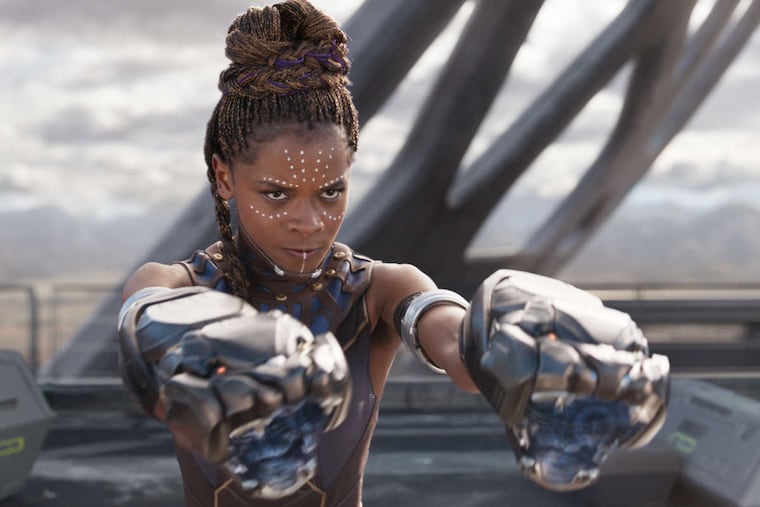'Black Panther' is a self-esteem boost, especially for brown girls | Elizabeth Wellington
As "Black Panther" 's credits rolled, I felt like the black girl who could do just about anything - except maybe wield a spear with the same beautiful confidence as the Dora Milaje.

I grew up during a time when the Super Friends ruled Saturday morning cartoons, so, like many of my peers, the very thought of Black Panther — the franchise's first movie with a superhero of color as its headliner — got me hyped.
And trust, Ryan Coogler, the director behind Fruitvale Station and Creed, did one heck of a cinematic job. The film, starring Chadwick Boseman as title hero T'Challa and Michael B. Jordan as his nemesis, Erik Kilmonger, was amazing. The backdrops, especially those featuring rushing waterfalls, were majestic. The car chases were intense. And the costumes were Afro-futuristic exquisite.
I laughed. I cried. I cheered. I sighed.
Read Gary Thompson's review: 'Black Panther': A heroic achievement
And, as a brown girl who dressed as Wonder Woman for at least five years in a row, sweating behind the plastic mask painted with the face of a white woman, I felt empowered by Coogler's vision. By the time the credits rolled, I was feeling like that black girl who could do anything — except maybe wield a spear like Okoye (Danai Gurira), a Dora Milaje soldier whose job is to protect King T'Challa.
Wakanda, Black Panther's fictional home, is a lush, East African nation teeming with indigenous tribes who worship ancestors through ancient rituals but who are also responsible for the world's most technologically advanced society. That is in large part due to the Wakandans' shrewd development of their country's natural resource vibranium. (Black Panther's bulletproof, energy-absorbing suit is made from vibranium.)
A force field made of vibranium effectively kept out colonizers. In other words, Wakanda was not raped and pillaged by Europeans. And in Coogler's Wakanda, the people didn't develop a sense of self built around intellectual, social, gender, and beauty limitations as defined by Western culture.
Wakandans don't look at their inherently black lives through a white lens.
Coogler makes this clear in subtle and not-so-subtle ways. Wakandan men stand tall and walk proud. T'Challa's strut is not George Jefferson-esque, overconfident to prove his worth. It's cool, calm, and collected. Wakanda is a patriarchal society, but the men generally lead with compassion. There is very little, if any evidence of misogyny. And you don't get the sense that these men are in any sort of competition with the women in their lives, always a major source of tension in black onscreen relationships.
The message is even clearer in Black Panther's women. They haven't been caught up in the mental drama and effects of Western influence. These black women are just women.
The result is that they are confident without being saddled with Madea's sass — overly loud so as not to be invisible — because that paradigm simply doesn't exist. Wakandan women make up the country's elite security force: Shuri (Letitia Wright), T'Challa's witty younger sister and easily my favorite character, is in charge of technology. She's the one who develops the Panther's suits. She's behind the flying automobiles and dope light rails.
Nakia (Lupita Nyong'o) is a spy we see as the leader of a secret humanitarian mission. Angela Bassett, playing Queen Romonda, is a regal, loving mom who keeps the traditions of her culture alive. There are many instances in this movie when black women — as in real life — are the saviors. In Coogler's Wakanda, the men are nothing without their women.
I also cheer because all of the black women in all their dark-hued and unchemically touched beauty are the center of attention; they are the ones who are romantically desired. In Wakanda, black women don't feel pressure to wear their hair straight. In fact, Okoye, who sports a shaved head, complains about the bobbed wig she's forced to wear as part of her disguise as an American black woman.
Ouch!
"Brown women don't often get to seem themselves as leading ladies, on screen or in real life," said Vashti DuBois, founder of the Colored Girls Museum in Germantown, who added she was excited by that prospect just from seeing the previews.
Fair-skinned black women were first put on pedestals by colonizers, and the sentiment has remained ingrained in the black community since. This has inflicted pain and insecurities on generations of black women, light and dark. And it persists: I would bet cold, hard cash that colorism was part of the motivation behind Leslie Jones' recent vulnerable admission that she fears dying alone because she's not considered "the pretty girl." She wouldn't have written that if she were from Wakanda.
It's also why Matthew Knowles stood in his cocky truth during an Ebony magazine interview a few weeks ago when he said his daughters, Beyoncé and Solange, are successful entertainers because their skin tones are lighter than the typical black girl's. And perhaps, said Dubois, it's behind former first lady Michelle Obama's choice to have her portrait done for the National Portrait Gallery by Amy Sherald, an artist known for gray scale, something I didn't think of at the time, but with all of the insults hurled at the former first lady because of her black features, it's completely possible.
"We internalize all of these message," Dubois said. "The impact is insidious, and it shows up insidious ways. This movie is about black people having a chance to truly see themselves as unapologetically black."
So, yes, I left empowered and completely psyched.
But I'm even more excited to see movies like Black Panther's impact on young women of color, because in Coogler's Wakanda, black women aren't asking for permission from anyone to stand in their greatness. They just do.